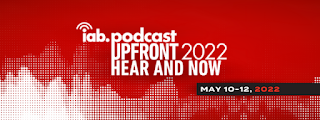From May 10-12, the IAB Podcast Upfronts are held via a digital conference forum. It's the podcast version of "you show me yours, and I'll show you mine."
What is the IAB? The Interactive Advertising Bureau (IAB) is an organization that works with publishers to foster the growth of advertising on the internet.
Every year, the IAB holds a three-day virtual conference This is a special marketplace designed for brands, agencies, and media buyers to preview the latest in innovative podcast programming. Leading audio and podcast networks showcase their brand and announce new shows.
On day one, host Franchesca Ramsey began with a spirited introduction and a lot of enthusiasm. Ramsey brought energy to the three-hour forum and infused the upfronts with the boundless optimism that seems to engulf podcasting today.
The first presentation featured IAB VP Eric John, who showed the meteoric climb in podcast revenue over the last five years. According to John, podcast advertising revenues will exceed two billion dollars by the end of 2022 and then soar to 4.2 billion dollars by the end of 2024.
One key message that John clearly communicated is that there is now a greater diversity of industries by sector that are using podcast advertising. The days of podcast ads consisting largely of mattress, audiobook, and meal delivery services spots are gone. Ads now range from insurance to retail stores.
Although dynamically inserted ads represent 84 percent of all podcast ads, host-read ads still appear to generate the most listener consumer response.
After that, a host of companies -- large and small -- made presentations about their existing and future content. For example, Disney had a wide range of podcasts due to its extensive brand ownership.
Paramount, which owns CBS, made its presentation later in the day and, along with Disney that owns ABC, demonstrated a clear trend. Broadcast networks are re-packaging their most popular shows as podcasts. ABC has 20/20, CBS has 60 Minutes and NBC has Dateline -- all long-running news / true-crime shows that translate well to podcasting.
Moreover, late-night shows are now moving beyond clips on YouTube to produce abbreviated podcast versions of their TV shows. I don't know the data analysis of whether a YouTube or podcast clip of a late-night show's monologue helps either live or DVR viewing, or hurts it.
I think iHeart Media's presentation was interesting because they focused on the "democratization of access" several times when speaking about their podcasts. To me, that's smart. I believe there is some "paywall panic" that podcasts will eventually be walled off from unfettered access and podcast networks will shield their content like streaming TV networks currently do.
iHeart's message was clear. Our shows will be accessible to all.
Later in the day, a smaller company, Spoken Layer, made an interesting presentation about short-form audio. To me, the presentation targets several concerns of advertisers and listeners. First, podcasts are becoming longer, even though podcast listeners typically reserve listening to restricted time periods like commuting, performing a task at home like cleaning, or exercising.
Second, podcasts can be, and should be, more cognizant of the time restrictions of its listening audience.
Finally, the most intriguing presentation was made by NPR. Not so much due to the content of its shows, although Everyone And Their Mom by Emma Choi is definitely "ear worthy."
The NPR presentation offered a key point: podcast ads should not overwhelm the listener, just like broadcast and cable TV have blanketed their content with endless ads that allow viewers to perform tasks like wash and wax their SUVs in between commercials.
NPR talked about its low ad slippage (10%), which is the percentage of listeners who skip ads. Their point was simple but effective. Too many ads encourage listeners to skip ads while a reasonable amount of ad time encourages listeners to listen to --and pay attention to -- the ads presented during a podcast episode.
What will day two hold? We will find it.

Comments
Post a Comment
Thank You for your input and feedback. If you requested a response, we will do so as soon as possible.